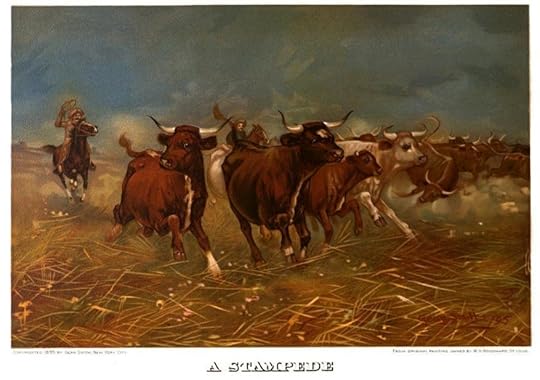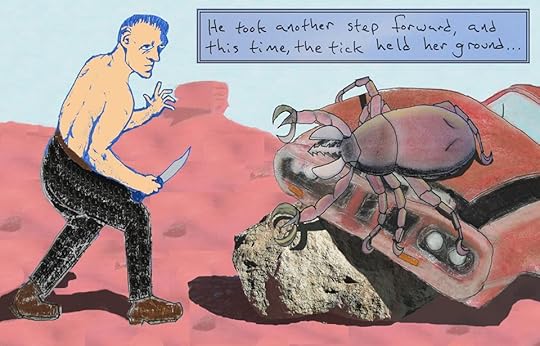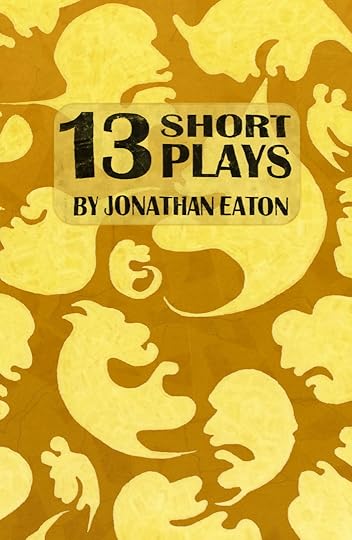Jonathan Eaton's Blog - Posts Tagged "writing"
A Stampede
Eating Kung Pao chicken, drinking Negra Modelo, writing "Rydell Tales (a novel)"
And when you read it, you're going to say to yourself, he can't have been eating Kung Pao chicken and drinking Negra Modelo while he wrote this--it is way, way too dark.
But it's true--you can live well and write dark.
Today's image is from a book I ran across in my research: "A Stampede" from: Historical and Biographical Record of the Cattle Industry (1895)
Whenever I see a painting like this, I think about the poor painter, standing there in front of his easel with a paint brush in his hand, thinking, "holy crap, I've got to finish this up quick !"

And when you read it, you're going to say to yourself, he can't have been eating Kung Pao chicken and drinking Negra Modelo while he wrote this--it is way, way too dark.
But it's true--you can live well and write dark.
Today's image is from a book I ran across in my research: "A Stampede" from: Historical and Biographical Record of the Cattle Industry (1895)
Whenever I see a painting like this, I think about the poor painter, standing there in front of his easel with a paint brush in his hand, thinking, "holy crap, I've got to finish this up quick !"

A Horse of a Particular Color
I’m 50K words into my current project, a novel, working title “Seven Texas Tales (a novel).” That puts me at about halfway done, and at the rate I’m going, I should be wrapping up a first rough draft by the end of the year.
For the last couple of weeks, I’ve been struggling with two problems: (1) A scene begging to be written, but with no real significance to the story as a whole, and (2) A plot problem that was resisting all attempts at defenestration. You know where this is going, right? I finally figured out that problem 1 was exactly the trebuchet I needed to rid myself of problem 2.
That’s a good day in novel writing.
Another interesting coincidence: A young man in my novel steals a horse. I decide that he names the horse Moses. Why Moses? I’m not sure—the name just kind of popped into my character’s head. Moses needs a color. I see him in my mind’s eye, but I don’t know enough about horse lingo to know what to call a horse of that color, so I look at a bunch of horses online, and find a “chestnut” horse that looks a whole lot like my Moses. I mean, my character’s Moses.
Next comes trying to describe what it is about Moses that makes my character decide to steal him. Something about the way the morning sun glints off his hide. Glints off his hide like a shiny brass . . . what? So I decide to look at famous things made of brass. What pops up, near, if not at the top of the list? A brass sculpture by Michelangelo . . . of Moses.
So here’s a very quick sketch of a very little bit of that sculpture—sorry man, but I’ve got a novel to write.

Why does bronze Moses have horns? You'll have to ask Mike.
By the way, did I ever tell you, there’s a bunch of free (FREE) short stories and essays by me and my friends available online? You can find them here:
https://coryluspress.com/short-stories/
For the last couple of weeks, I’ve been struggling with two problems: (1) A scene begging to be written, but with no real significance to the story as a whole, and (2) A plot problem that was resisting all attempts at defenestration. You know where this is going, right? I finally figured out that problem 1 was exactly the trebuchet I needed to rid myself of problem 2.
That’s a good day in novel writing.
Another interesting coincidence: A young man in my novel steals a horse. I decide that he names the horse Moses. Why Moses? I’m not sure—the name just kind of popped into my character’s head. Moses needs a color. I see him in my mind’s eye, but I don’t know enough about horse lingo to know what to call a horse of that color, so I look at a bunch of horses online, and find a “chestnut” horse that looks a whole lot like my Moses. I mean, my character’s Moses.
Next comes trying to describe what it is about Moses that makes my character decide to steal him. Something about the way the morning sun glints off his hide. Glints off his hide like a shiny brass . . . what? So I decide to look at famous things made of brass. What pops up, near, if not at the top of the list? A brass sculpture by Michelangelo . . . of Moses.
So here’s a very quick sketch of a very little bit of that sculpture—sorry man, but I’ve got a novel to write.

Why does bronze Moses have horns? You'll have to ask Mike.
By the way, did I ever tell you, there’s a bunch of free (FREE) short stories and essays by me and my friends available online? You can find them here:
https://coryluspress.com/short-stories/
Published on August 05, 2018 18:57
•
Tags:
bronze, horse, michelangelo, writing
David/2
When I start a new novel, I say to myself, “I wonder where this is going?” When I finish a new novel, I say to myself, “So that’s where that was going!” But when I’m about where I am now on this current project (somewhere around the halfway point) I say to myself “Cheese and Crackers writing a novel is a lot of work!”
But is it, really? Is writing a novel “a lot of work?”
To answer this question, I tried think of something that I could feel in my bones was a whole lot of work, then compare that to writing a novel, to get some idea of how much work it really was. What I thought of was carving a credible likeness of a person out of a chunk of marble. No question in my mind that that would be a whole lot of work. A mess-o-work, for sure.
Extensive research (i.e., reading a Wikipedia article) indicated it took Michelangelo about two years to carve his David—two years for Michelangelo to turn one hefty chunk of marble into Dave the Giant Killer. (Dave is seventeen feet tall and weighs north of six tons, btw.) It's true someone had apparently started on a leg before Michelangelo got the job, but if anything, that probably only made things harder for Michelangelo. In my software developer days, I'd sometimes get a project where my boss would say "Alice got started on a leg but then she left for a better job with Mickey D's, so I'm giving this project to you, and you're already a 'leg up' on it! Aren't you lucky?"
Nope. the last thing you want is a project that's a big block of stone with one crappy leg sticking out of it.
Anyway . . . it takes me about a year to write a novel, and I “chip away” (forgive me) at it pretty steadily during that time. I’m not saying I’m a Michelangelo artistic-wise, but I have no reason to think I’m a slouch when compared to him work-ethic wise.
So how much work is it to write a novel? About this much work:

Now you know.
But is it, really? Is writing a novel “a lot of work?”
To answer this question, I tried think of something that I could feel in my bones was a whole lot of work, then compare that to writing a novel, to get some idea of how much work it really was. What I thought of was carving a credible likeness of a person out of a chunk of marble. No question in my mind that that would be a whole lot of work. A mess-o-work, for sure.
Extensive research (i.e., reading a Wikipedia article) indicated it took Michelangelo about two years to carve his David—two years for Michelangelo to turn one hefty chunk of marble into Dave the Giant Killer. (Dave is seventeen feet tall and weighs north of six tons, btw.) It's true someone had apparently started on a leg before Michelangelo got the job, but if anything, that probably only made things harder for Michelangelo. In my software developer days, I'd sometimes get a project where my boss would say "Alice got started on a leg but then she left for a better job with Mickey D's, so I'm giving this project to you, and you're already a 'leg up' on it! Aren't you lucky?"
Nope. the last thing you want is a project that's a big block of stone with one crappy leg sticking out of it.
Anyway . . . it takes me about a year to write a novel, and I “chip away” (forgive me) at it pretty steadily during that time. I’m not saying I’m a Michelangelo artistic-wise, but I have no reason to think I’m a slouch when compared to him work-ethic wise.
So how much work is it to write a novel? About this much work:

Now you know.
Published on August 18, 2018 13:48
•
Tags:
david, michelangelo, novel, work, writing
Mind the Chelicerae
The other day, we were on our way to lunch when my wife asked me if I put a lot of myself in my characters. "That's a good question," I said, and off I went. Fortunately for my wife, our favorite Korean restaurant is only a fifteen minute drive away, and nothing shuts me up quite as quick as a sizzling stoneware pot of bibimbap.
You are not so lucky.
I am a pretty mild-mannered guy. Not a chump or a pushover (I hope), and I can be really, really stubborn, but I am definitely someone who will go to great lengths to avoid unpleasantness. Fictional versions of guys like me don't make great protagonists in a novel, and yet, I felt compelled to create them. The problem was, if I tried to write a character differently, it felt really phony. I would say to myself, "no one is going to believe that person would do that interesting, stress-inducing thing." I felt the constraint, and I hated the constraint, but I didn't know what to do about it.
So the first two novels I wrote were pretty crappy and shall never see the light of day (while I live, anyway). When I started on my third novel "Walther Harp Dreams" I knew I had to do something. So I made the protagonist a lot like me, but I gave him a strange neurosis, a sort of OCD that compels him to complete certain tasks, regardless of the consequences. By the time I was done with the novel (which I consider my first not-terrible novel) I realized that "Kirby” didn’t have to have a neurosis to do what he did, he could just be a guy that did that sort of thing. What to me was a neurosis was, to Kirby, just being Kirby.
That was a real breakthrough for me, and has opened up a whole new world of writing possibilities. Just because I would never venture out into the Scablands to hunt down giant mutated ticks for the purpose of extracting their valuable salivary glands, doesn’t mean Pete Barlow wouldn’t. All I can say is, more power to ya, Pete (and mind the chelicerae!).

You are not so lucky.
I am a pretty mild-mannered guy. Not a chump or a pushover (I hope), and I can be really, really stubborn, but I am definitely someone who will go to great lengths to avoid unpleasantness. Fictional versions of guys like me don't make great protagonists in a novel, and yet, I felt compelled to create them. The problem was, if I tried to write a character differently, it felt really phony. I would say to myself, "no one is going to believe that person would do that interesting, stress-inducing thing." I felt the constraint, and I hated the constraint, but I didn't know what to do about it.
So the first two novels I wrote were pretty crappy and shall never see the light of day (while I live, anyway). When I started on my third novel "Walther Harp Dreams" I knew I had to do something. So I made the protagonist a lot like me, but I gave him a strange neurosis, a sort of OCD that compels him to complete certain tasks, regardless of the consequences. By the time I was done with the novel (which I consider my first not-terrible novel) I realized that "Kirby” didn’t have to have a neurosis to do what he did, he could just be a guy that did that sort of thing. What to me was a neurosis was, to Kirby, just being Kirby.
That was a real breakthrough for me, and has opened up a whole new world of writing possibilities. Just because I would never venture out into the Scablands to hunt down giant mutated ticks for the purpose of extracting their valuable salivary glands, doesn’t mean Pete Barlow wouldn’t. All I can say is, more power to ya, Pete (and mind the chelicerae!).

Published on August 26, 2018 18:30
•
Tags:
characters, novels, ticks, writing
Theme is Bones
Cyndi asked me this morning "So, how does it feel to have finished the novel?"
Strangely (perhaps) finishing a novel feels to me very much like finishing a big project did in my software development days, which I can sum up as follows: "You know, that turned out pretty well, but if I had it to do all over again . . ."
Or to put it another way, writing a novel is always a learning experience for me. So what did I learn this time?
I learned about theme. I came to the conclusion that "theme" is something that is more important to writers than to readers. It gives the writer something to cling to—a way to focus their thoughts about the novel. A theme is a novel's mantra. Without a theme, a novel would just be stuff that happens.
I don't worry too much about plot or characters when I write. If you throw a bunch of interesting people with different objectives and motivations into an interesting and difficult situation, and you let those characters be themselves, they will do interesting things. But without something to hold all those interesting things together, a novel can feel unpleasantly messy, like when you're trying to eat a sandwich with all sorts of great stuff in it but chunks keep falling out of the sandwich into your lap.
Making a sandwich is a form of architecture. So is making a Frankenstein's Monster. So is writing a novel. Theme is buns. Theme is rebar. Theme is bones.
Another thing I learned about theme is that while a theme can hold a novel together as it goes from point A to point B, you still have to have a point A and B. It wasn’t long before I knew this novel was going to get messy. Once I'd figured out the theme, I thought I'd won the battle--I was herding the cats, as it were--but herding cats and getting a herd of cats to a place that really wants a herd of cats are two different things entirely.
That turned out to be the real struggle with this novel, and if I had it to do all over again . . .
Anyway, it's a good novel, and well worth 99¢ for the Kindle version. Read it, and tell me what you think the theme is.
https://www.amazon.com/dp/B07K5J12FV

Strangely (perhaps) finishing a novel feels to me very much like finishing a big project did in my software development days, which I can sum up as follows: "You know, that turned out pretty well, but if I had it to do all over again . . ."
Or to put it another way, writing a novel is always a learning experience for me. So what did I learn this time?
I learned about theme. I came to the conclusion that "theme" is something that is more important to writers than to readers. It gives the writer something to cling to—a way to focus their thoughts about the novel. A theme is a novel's mantra. Without a theme, a novel would just be stuff that happens.
I don't worry too much about plot or characters when I write. If you throw a bunch of interesting people with different objectives and motivations into an interesting and difficult situation, and you let those characters be themselves, they will do interesting things. But without something to hold all those interesting things together, a novel can feel unpleasantly messy, like when you're trying to eat a sandwich with all sorts of great stuff in it but chunks keep falling out of the sandwich into your lap.
Making a sandwich is a form of architecture. So is making a Frankenstein's Monster. So is writing a novel. Theme is buns. Theme is rebar. Theme is bones.
Another thing I learned about theme is that while a theme can hold a novel together as it goes from point A to point B, you still have to have a point A and B. It wasn’t long before I knew this novel was going to get messy. Once I'd figured out the theme, I thought I'd won the battle--I was herding the cats, as it were--but herding cats and getting a herd of cats to a place that really wants a herd of cats are two different things entirely.
That turned out to be the real struggle with this novel, and if I had it to do all over again . . .
Anyway, it's a good novel, and well worth 99¢ for the Kindle version. Read it, and tell me what you think the theme is.
https://www.amazon.com/dp/B07K5J12FV

A Few of my Favorite Things
10 of my favorite things about writing, in no particular order:
1) Creating a whole person, community, world, or even universe, out of nothing.
2) Being able to spend hours or days coming up with the perfect snappy comeback.
3) Connecting with other writers and people who love books.
4) Getting a review where it's clear the reader got exactly what you were going for.
5) Getting a review where the reader came up with something cool that never even crossed your mind.
6.1) Thinking through/trying on alternative perspectives and life-strategies, through characters who see the world, and react to it, differently than you do.
6.2) Sneakily getting readers to consider alternative perspectives and life-strategies, through characters who see the world, and react to it, differently than they do.
7) Escaping reality for a while.
8) Daydreaming about what Terry Gross is going to ask me on my “Fresh Air” interview.
9) Mulling over which directors and leading actors I'm going to choose for that movie that is definitely going to be made some day.
10) The many opportunities for being silly.

1) Creating a whole person, community, world, or even universe, out of nothing.
2) Being able to spend hours or days coming up with the perfect snappy comeback.
3) Connecting with other writers and people who love books.
4) Getting a review where it's clear the reader got exactly what you were going for.
5) Getting a review where the reader came up with something cool that never even crossed your mind.
6.1) Thinking through/trying on alternative perspectives and life-strategies, through characters who see the world, and react to it, differently than you do.
6.2) Sneakily getting readers to consider alternative perspectives and life-strategies, through characters who see the world, and react to it, differently than they do.
7) Escaping reality for a while.
8) Daydreaming about what Terry Gross is going to ask me on my “Fresh Air” interview.
9) Mulling over which directors and leading actors I'm going to choose for that movie that is definitely going to be made some day.
10) The many opportunities for being silly.

Published on March 22, 2019 01:29
•
Tags:
authors, favorite-things, writing
How to be a Doctor
If you want to be a doctor, you need to do a little bit of doctoring every day. Doesn’t have to be brain surgery—you can just perform an appendectomy, or lance a boil. If you’re really busy, give a friend some medical advice, or walk into the nearest morgue and perform a quick autopsy. The doctoring you do doesn’t have to be much—doesn’t have to be “good”—just do it. Get into the habit, and soon you will have that thriving medical practice you’ve always wanted.
Obviously, that’s not going to work. And yet, so often people (even writers!) say that if you want to be a writer, you need to sit down every day and write something. Like removing an appendix before your first day of medical school, that’s putting the cart before the horse. So what should a writer have, before sitting down to write? Eight years of writer school? Nah, I don’t think so.
You need an idea.
What makes you want to write so bad you can hardly stand it? If you’re like me, it’s a great idea for a story, or for a scene in a novel.
What is “writer’s block”? Writer’s block is that miserable condition of wanting to write and not being able to think of something you want to write about. And what advice are wannabe writers so often given? “Don’t worry about having something you want to write about, just write something.” Sure, invite those starry-eyed word-worshippers to see how long they can stand a daily dose of self-inflicted writer’s block, and when they find they’d actually rather do laundry, or the dishes, or binge-watch something on Netflix, well, it’s not your fault they lacked the extraordinary will-power it takes to be a writer.
There are bound to be some people out there who can force themselves to sit down and write a great novel, while hating every minute of it, but for most of us mere mortals, if we don’t want to write, we’re not going to write—life is just too distracting (and anyway, is that what you want? To spend a year or more doing something that makes you miserable, just so you can say “I wrote a novel”? Really?)
So how do you get that story idea that begs you to write it? I think you have to do two things: First, you have to find an idea, and second, you have to nurture it. I think most of us have ideas for stories, but fall through on the nurturing part. So how to nurture? For me, it’s reading related materials, and thinking about the idea without distractions (AKA a long walk in the park).
Bottom line, get yourself really worked up over an idea, and then sit down every day and write. If you don’t feel like writing, taking a long walk in the park and get yourself excited about your idea again.
One more thing: if you’re going to be a writer, you’re going to have to get over any shyness you feel about self-promotion, i.e., here’s my latest, a book of short plays I wrote especially for staged readings (but I think they’d make great little performance pieces as well). If you know anyone who might be interested, please send 'em the link.

Obviously, that’s not going to work. And yet, so often people (even writers!) say that if you want to be a writer, you need to sit down every day and write something. Like removing an appendix before your first day of medical school, that’s putting the cart before the horse. So what should a writer have, before sitting down to write? Eight years of writer school? Nah, I don’t think so.
You need an idea.
What makes you want to write so bad you can hardly stand it? If you’re like me, it’s a great idea for a story, or for a scene in a novel.
What is “writer’s block”? Writer’s block is that miserable condition of wanting to write and not being able to think of something you want to write about. And what advice are wannabe writers so often given? “Don’t worry about having something you want to write about, just write something.” Sure, invite those starry-eyed word-worshippers to see how long they can stand a daily dose of self-inflicted writer’s block, and when they find they’d actually rather do laundry, or the dishes, or binge-watch something on Netflix, well, it’s not your fault they lacked the extraordinary will-power it takes to be a writer.
There are bound to be some people out there who can force themselves to sit down and write a great novel, while hating every minute of it, but for most of us mere mortals, if we don’t want to write, we’re not going to write—life is just too distracting (and anyway, is that what you want? To spend a year or more doing something that makes you miserable, just so you can say “I wrote a novel”? Really?)
So how do you get that story idea that begs you to write it? I think you have to do two things: First, you have to find an idea, and second, you have to nurture it. I think most of us have ideas for stories, but fall through on the nurturing part. So how to nurture? For me, it’s reading related materials, and thinking about the idea without distractions (AKA a long walk in the park).
Bottom line, get yourself really worked up over an idea, and then sit down every day and write. If you don’t feel like writing, taking a long walk in the park and get yourself excited about your idea again.
One more thing: if you’re going to be a writer, you’re going to have to get over any shyness you feel about self-promotion, i.e., here’s my latest, a book of short plays I wrote especially for staged readings (but I think they’d make great little performance pieces as well). If you know anyone who might be interested, please send 'em the link.

Published on October 02, 2019 10:17
•
Tags:
writing
Method as Poetry
A big part of writing is thinking up the right word. When I'm really struggling to find that word, I sometimes resort to list-making. I ran across some notes I'd made in the course of an unfinished work, and I found a list where I was trying to complete a simile. I thought the list worked pretty well as a poem. Here it is:
***
Common As
Common as lies
Common as flies
Common as Pharaohs in Egypt
Common as stitches in a tailor's shop
Common as stars on a moonless night
Common as talk
Common as days
Common as bungles
Common as cures
Common as earthnappers
Common as dreams in a youthful heart
***
***
Common As
Common as lies
Common as flies
Common as Pharaohs in Egypt
Common as stitches in a tailor's shop
Common as stars on a moonless night
Common as talk
Common as days
Common as bungles
Common as cures
Common as earthnappers
Common as dreams in a youthful heart
***



